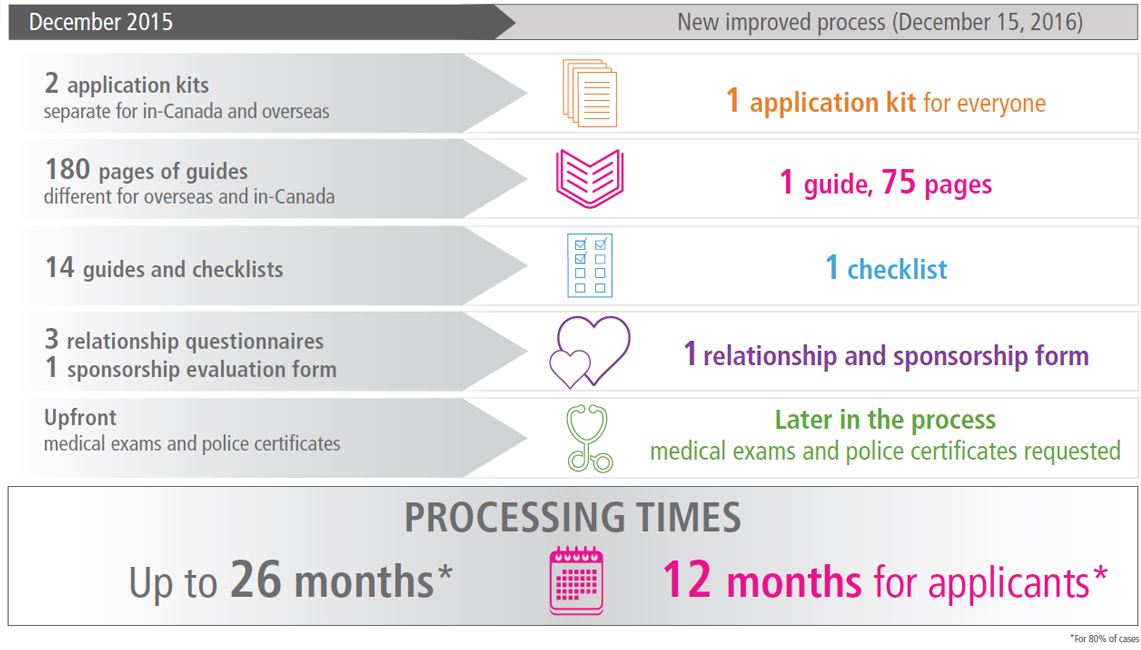So, are you studying in Canada or want to study in Canada? But want to take your family with you too?
If yes, here’s good news. You can sponsor your spouse to live with you through a spousal open work permit.
The best part is that your spouse can earn in Canada, so you can complete your studies while your spouse can do their job to help you.
This article mentions all the essential information you will need to apply for an open work permit for a spouse in Canada. So, let’s dive in.
What is A Spousal Open Work Permit in Canada?

Spousal work permit is an employment visa that lets non-Canadian spouses work in Canada. It helps spouses work in Canada while also living with their significant other.
Eligibility Criteria For Spousal Open Work Permit In Canada
To qualify for SOWP, you must meet specific eligibility requirements Canada sets. They are:
- You must have a legal or genuine relationship with the foreign national applicant, permanent resident, or citizen.
- You must be eligible to apply as a foreign national spouse or a Canadian sponsorship applicant.
You Must Never:
- Harm any Canadian citizen
- Work with an ineligible employer
- Indulge in services like escort services, massage sessions, etc.
- They are not medically inadmissible in Canada.
Documents Required To Apply For Spousal Open Work Permit In Canada

Before applying for an open work permit, keep all the documents ready. Below are the top documents you would need for the SOWP application.
- Original marriage certificate (along with an official translation if the certificate is in a regional language other than English or French) or Common law declaration form (IMM5409)
- Family Information form (IMM5707 or 5645). Please note, include this form only if it is in your documentation checklist.
- Copy of passport (Also includes the bio-data page and any pages with stamps, visas, or markings)
- Digital photo
- Proof of funds (Bank statements for a spouse who is in Canada as an FT student can also be used)
- Acknowledgment of Receipt (AOR) letter
- Proof of status in Canada
- Medical exam results (if requested)
- Proof of spouse’s status in Canada
- Completed application forms
- Certificat d’acceptation du Québec (CAQ) (Quebec Acceptance Certificate) (if working in Quebec)
Documents of Applicant Spouse
- Copy of study permit
- UBC Letter of Enrollment if applicable
Please note: If the spouse or joint applicant holds a post-graduation work permit, proof of employment in NOC O, A, or B must be submitted. This should also include a copy of the job offer and the latest 3 pay statements for the PGWP holder.
What If You Have Children? Does Spousal Open Work Permit In Canada allow you to bring them to Canada?
Hmm, what if you have children? Can you bring them with you?
The answer is Yes. Your dependent children can come with you and your spouse, provided they meet the temporary resident criteria for Canada. The criteria are:
- They must be able to satisfy an immigration officer that they will be living in Canada only temporarily.
- The child is under 22 years old and does not have a common in law partner or spouse.
- Must prove they do not have a criminal record.
- Meet all the requirements for a temporary Canada visa.
Please note:
- Children above 22 years of age are still considered dependent if:
- They are dependent on you for finances before the age of 22.
- Due to physical or mental impairment, they cannot take on their financial responsibilities.
- To study in Canada, children must have a study permit. Apply for it when you apply for yours.
Timeline: How Long Does It Take to Process an Open Work Permit For Spouse?
 Your open work permit for your spouse starts processing once you complete your full application. However, the time taken to process the work permit depends on the individual situation. The official website mentions, it may take up to 12 months to review the SOWP application.
Your open work permit for your spouse starts processing once you complete your full application. However, the time taken to process the work permit depends on the individual situation. The official website mentions, it may take up to 12 months to review the SOWP application.
To ensure your application is not delayed or entirely rejected, here are some tips to follow:
- Carefully read the application and your eligibility criteria.
- Include all the documents requested in the application. Any missing document can cause delays or result in the rejection of an application.
- Ensure you have paid the correct fee from a right payment method
- Double-check all your information. Even a single mistake can get your application rejected.
- Respond to their request as soon as possible to avoid delays.
- Medical and security screening can sometimes delay the processing. There is no other choice but to wait.
- The interview can also delay processing.
What Are The Application Charges To Apply For an Open Work Permit For a Spouse?
Application fees of SOWP vary anywhere between $155 CAD and $255 CAD, depending on processing time. Whereas open work permit holders have to pay $100 CAD.
How Long Does A Spousal Open Work Permit In Canada Last?
It’s essential to know how long your permit will last because, without a permit, your spouse won’t be able to live in Canada legally.
The open work permit for partners expires when the applicant’s passport expires, or the study permit expires if studying.
But what if your spousal work permit expires before you finish your studies in Canada? Can you renew it? Read below to find out what you need to do.
How To Renew Your Spousal Open Work Permit?
We completely understand the anxiety that overwhelms you when the open work permit for a spouse is near the end of its term.
But it’s not possible to renew your SOWP. This is because SOWP is tied to the lead applicant permit. As soon as the permit for the lead applicant expires, your permit expires too. So, you must reapply for the permit.
What Are The Benefits of Open Work Permit For Spouse?
1. Live with your spouse
Living with your spouse is the most valuable benefit of SOWP Canada. Without a SOWP, our spouse would have to apply for immigration to enter and work in Canada. Not only that, the other permit often restricts where your spouse can work. SOWP, on the other hand, gives you the chance to study in Canada and live with your spouse while they can earn a living with complete freedom of choice.
2. Freedom to work anywhere
Most closed permits allow foreign nationals to work only with one type of employer. This becomes a nuisance, as the employer may not provide the benefits you and your spouse desire or need. So, when you apply for SOWP in Canada, the spouse is not restricted to a single employer and does not need to get a Labor Market Impact Assessment(LMIA)
3. Your Partner Can Work In Canada While They Wait For The Status Of Other Application
If your spouse has applied for Immigration, Refugees, and Citizenship in Canada, they will need to wait for up to 12 months before they can start working in Canada. This is, however, not the case with SOWP. Under SOWP, your spouse can start working while they wait for immigration or other sponsorship application status.
4. Get a Canadian Living Experience
As an international student wishing to live in Canada after completing your studies, the SOWP is an excellent opportunity to have a Canadian experience with your spouse. This is while you study and work. Moreover, you and your spouse would have significant career growth as studies have shown that having Canadian work experience corresponds to higher earning potential.
What Are Reasons For Spousal Open Work Permit Rejection?
There may be several reasons why officers decided to reject your application. Here we have listed the most popular reasons for rejection of SOWP.
1. The Lead Applicant is living outside Canada.
Until you confirm that your spouse (the lead applicant) legally resides in Canada, your SOWP application won’t be processed. The SOWP clearly states that the lead applicant must be living inside Canada or be a permanent resident, national, or have temporary status to live in Canada to be able to apply for SOWP. Until you confirm that your spouse (the lead applicant) legally resides in Canada, your SOWP application won’t be processed. If your spouse remains in Canada even after being born here, your application will get rejected.
2. They Were Not Satisfied With Your Relationships Claim

The open work permit for spouses applies to married couples and common-law partners. If the officers are not satisfied with your claims that you are legally married, your application can get rejected
There have been many cases in India where spouses fund their partners’ education to get them to Canada. So, if your application got rejected, don’t be sad. Give them enough proof, and it will be approved.
3. Lacking Proof of Funds
One of the conditions for an open work permit for a spouse is that both the applicant and their spouse must have sufficient funds to live in Canada. If the officers think you do not have enough funds to sustain yourself in Canada, they may reject your application. As a result, it’s essential to have all the financial documents ready to satisfy the officer that you have enough funds to live in Canada.
How to Apply for Spousal Open Work Permit In Canada?
Now that you have all the information, it’s time to apply for SOWP. Follow the steps below.
Step 1: Visit the official Canadian government site and follow the instructions. Or Create your account here.
Step 2: Get all your documents ready.
Step 3: Fill out the application. Get biometrics. Make sure the documents are submitted, and the right payment is made.
(Note: You may require a medical examination to enter Canada, for that officer will guide you further)
Step 4: Submit your application and wait. You can check the status of your application by logging in to your account.
Conclusion:
There it is. Full guide to help you apply for Spousal Open Work Permit in Canada. We hope you got all your questions answered.
Frequently Asked Questions
Question 1: Why was my spousal open work permit rejected?
Answer: There are several reasons why your SOWP may get rejected. They are officers who are not convinced that you have sufficient funds or marital status. Sometimes, your spouse may not be eligible to work in Canada, etc.
Question 2: Can I reapply if my spousal open work permit is rejected?
Answer: Yes. You can reapply if your SOWP is rejected for various reasons. However, remember that you should only reapply if you have additional information or documents to address the reason for refusal.
Question 3: How long does it take for a spouse to apply for a work permit for Canada from India?
Answer: The short answer is it depends! The long answer is, it can take anywhere between 6 to 12 months to process your application and get your spouse’s open work permit for Canada. However, you must ensure that your spouse can legally live in Canada as if they are studying in Canada or are working in Canada.
Question 4: What is the minimum income to sponsor a spouse in Canada?
Answer: Currently, there is no minimum income requirement for sponsor spouses in Canada. However, you must show that you can afford to stay in Canada to meet the requirements.
Question 5: What Happens If Spouses and I separate?
Answer: In case you and your spouse separate after processing of SOWP, you can still live legally in Canada till the expiry date of SOWP. However, if you both separate during the processing, you must inform IRCC and would no longer be eligible for SOWP.






